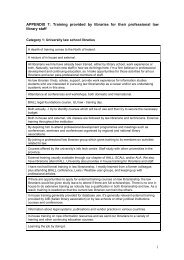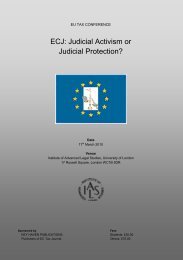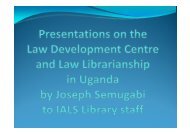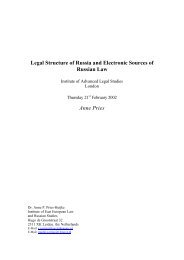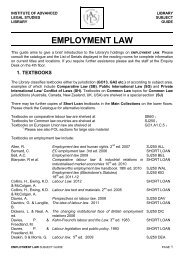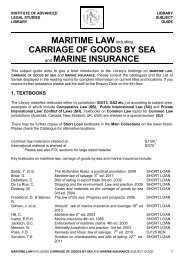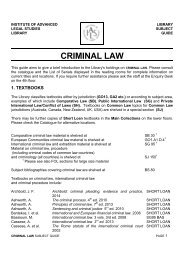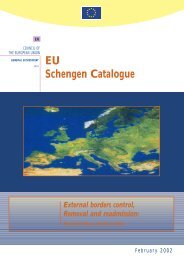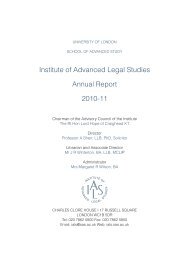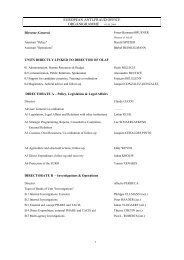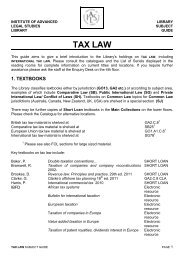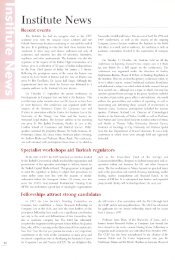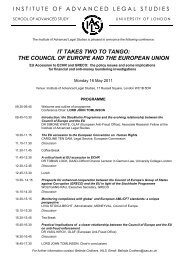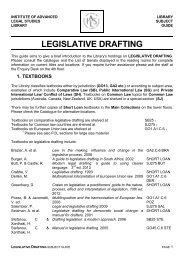a thesis - Institute of Advanced Legal Studies
a thesis - Institute of Advanced Legal Studies
a thesis - Institute of Advanced Legal Studies
You also want an ePaper? Increase the reach of your titles
YUMPU automatically turns print PDFs into web optimized ePapers that Google loves.
38 EXPRESS TRUSTS.<br />
L. It. 6 Cli. App. 597), in which James, L. J.,in deciding that no trust<br />
had been created, said: "In hearing case after case cited, I could<br />
not help feeling that the <strong>of</strong>ficious kindness <strong>of</strong> the Court <strong>of</strong> Chancery<br />
in interposing trusts where in many cases the father <strong>of</strong> the family<br />
never meant to create trusts must have been a very cruel kindness<br />
indeed. I am satisfied that the testator in this case would have<br />
been shocked to think that any person calling himself a next friend<br />
could file a bill in this court, and, under pretence <strong>of</strong> benefiting the<br />
children, have taken the administration from the wife. I am<br />
satisfied that no such trust was intended, and that it would be a<br />
violation <strong>of</strong> the clearest and plainest wishes <strong>of</strong> the testator if we<br />
decide otherwise."<br />
This view <strong>of</strong> the meaning <strong>of</strong> precatory words having been<br />
followed in several other cases (see below), the conflict between the<br />
older and modern authorities was at length settled by the Court <strong>of</strong><br />
Appeal in favour <strong>of</strong> the latter in In re Adams and the Kensington<br />
Vestry (1884, 27 Ch. D. 394), in which Cotton, L. J., said: "I<br />
have no hesitation in saying myself that I think some <strong>of</strong> the older<br />
authorities went a great deal too far in holding that some particular<br />
words appearing in a will were sufficient to create a trust. ....<br />
Having regard to the later decisions, we must not extend the old<br />
cases in any way or rely upon the mere use <strong>of</strong> any particular<br />
words, but, considering all the words which are used, we have to<br />
see what is their true effect, and what was the intention <strong>of</strong> the<br />
testator as expressed in his will."<br />
These opinions have frequently been approved, and the<br />
decisions have been uniformly followed by the Court <strong>of</strong> Appeal<br />
(see, e.g., In re Diggles, Gregory v. Edmondson (1888), 39 Ch. D.<br />
258; In re Hamilton, Trench v. Hamilton, (1895) 2 Ch. 370 ; Hillv.<br />
Hill, (1897) 1 U. B. 483 ; In re Williams, Williams v. Williams,<br />
(1897) 2 Ch. 18 ; In re ffanbury, Hanburtj v. Fisher, (1904) 1 Ch.<br />
415 ; and In re Ohlfield, Oldfield v. Oldfield, (1904) 1 Ch. 549),<br />
save that in In re Williams Eigby, L. J., who dissented from the<br />
opinion <strong>of</strong> the majority, said: " In theory I do not think there<br />
ever has been, at any rate for a century, any doubt as to the<br />
principles on which a trust or condition should be deduced, if at<br />
all. .... On these fundamental points there never has been any<br />
real difference, though the application <strong>of</strong> them to particular cases<br />
has not always been satisfactory. Of course the Court <strong>of</strong> Appeal<br />
cannot in recent cases have intended in any way to alter the settled<br />
law on the subject, or to have assumed a jurisdiction to deal with



